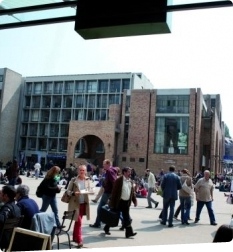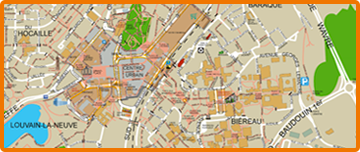
Interactive city map »

Contact


Contact
us

Discovery tour
Newsletter
Get tourist news on Ottignies-Louvain-la-Neuve
Home » The City and its University » University Town


University town
The university town of Louvain-la-Neuve is an urban project initiated by the Catholic University of Louvain at the end of the sixties, following the move of the Francophone section of the Catholic University of Louvain, originally located in Leuven. The placing of the first brick by the King Baudouin on February 2, 1971 marked the moment that the Louvain-la-Neuve project became a reality. At the same time, UCL created the Woluwe campus for its medical school and an important university hospital.
The Louvain-la-Neuve site
From the beginning of the seventies, the meadows, woods and fields of the Lauzelle plateau left a place for a true university town.The university buildings are dispersed throughout the site to promote contact between the different users of the urban center. Shops, businesses, administrative premises and housing are mixed together with academic buildings. The districts, mainly residential, are quickly accessible on foot.
Watch the introductory film on Louvain-la-Neuve
Confusion between Louvain/Leuven and Louvain-la-Neuve: discover the little film made by and international student (8 minutes)
Confusion between Louvain/Leuven and Louvain-la-Neuve: discover the little film made by and international student (8 minutes)
Photos: copyright Jacky Delorme
Some city figures
- 11,000 people live in Louvain-la-Neuve, community entity of Ottignies-Louvain-la-Neuve.
- More than 10,000 ‘koteurs’ (“dormers”, UCL student residents)
- 50,000 people welcomed each day, including 15,000 employees
- 920 hectares including :
- the Lauzelle Woods (198 hectares)
- green spaces (168 hectares)
- a golf course (64 hectares)
- a lake (7 hectares)
- a pedestrian center (4 hectares)
- a science parc (231 hectares)
- 6 districts: Baraque, Biéreau, Bruyères, Centre, Hocaille, Lauzelle
- More than 300 shops and businesses, including a shopping mall (100 shops)
A multi-secular university
Founded in 1425 in Louvain (Leuven), the UCL is one of the oldest universities in the world, like Oxford, Paris, Coimbra, Salamanca, Bologna or Heifelberg. Celebrities have attended and taught there, including Erasme, Mercator, Vésale, etc. In the 20th century, important people like Georges Lemaître, author of the Big Bang theory, and Christian de Duve, Nobel Prize winner in medicine, taught at the university.
Present on 7 sites in Brussels and Wallonia, the actual UCLouvain is the first French-speaking university in Belgium and the second-largest complete french-language university in the world according to international rankings. Every year she graduates one out of two university students in French-speaking Belgium. The UCLouvain proposes a wide range of courses and research programs organised in 14 faculties and 22 research institutes and split in three sectors : social sciences, science and technology, and health science.
Université catholique de Louvain







